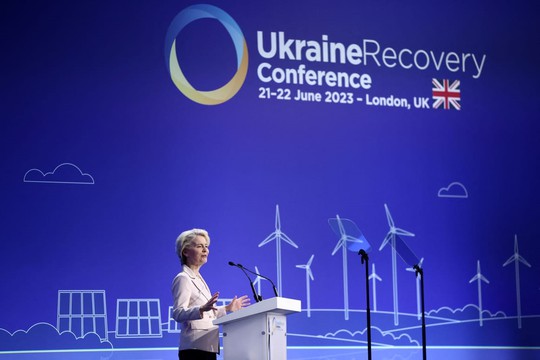It was a bad idea when in June, Commission President Ursula von der Leyen pledged to make a proposal on how to leverage Russian state assets "before the summer break," but nothing was forthcoming
Photo: AFP
EU countries have poured cold water on a plan to use revenue generated from Russian assets frozen since the start of Moscow's invasion of Ukraine to support the war-torn country's reconstruction.
Several ambassadors from the bloc’s 27 governments argued that an idea drawn up by Spain, in its role at the helm of the EU’s rotating six-month presidency, would not give Ukraine’s economy the urgent boost it needs, and instead risks undermining the EU’s commitment to provide support to Kyiv.
For months, EU officials have been exploring ways to skim off the earnings from assets worth some $300 billion that were immobilized after the war began. But the plan has drawn skepticism from some governments, including France and Germany, as well as from the European Central Bank, which fears it could cause instability in the euro currency.
The criticism came to a head at a meeting of EU envoys on Tuesday evening. Under Spain's proposal, obtained by POLITICO and discussed at the meeting, Madrid estimated that profits from the Russian central bank reserves frozen in EU countries could generate €15 billion to €17 billion for Kyiv by 2027.
According to officials who spoke to POLITICO on condition of anonymity because of the sensitivity of the discussions, several countries claimed the Spanish proposal didn't satisfy the EU’s priority of supporting Ukraine because it would take months ― possibly even years ― for Kyiv to see the money. There was also confusion over how Madrid had arrived at its numbers.
The idea to use the cash generated by the frozen assets emerged from a review of how the EU spends its money, which Spain is conducting.
The Commission has said it wants to give Kyiv €17 billion in grants plus €33 billion in low-interest loans up to 2027 to prevent the country from going bankrupt. If that money doesn't come from the earnings generated by the frozen assets, it would have to be funded from elsewhere.
Any decision will require unanimity among all 27 member countries.
Given that Spain’s proposal was so contrary to the views of most other governments, several diplomats speculated it had been drafted by Spanish government officials in Madrid with little knowledge of the mood across the rest of the EU.
“This is not an acceptable base for discussion at EUCO [the December 14-15 summit of EU leaders] for many countries,” said one diplomat.
Russian foreign reserves were frozen by countries participating in sanctions at the onset of Moscow's war on Ukraine; the majority sit in the EU. For example, some €180 billion are with Belgium’s Euroclear, a clearing house acting as a custodian for Russian reserves.
As Russian securities reach maturity and are reinvested by financial intermediaries, they generate a profit.
The talks on generating revenues from those assets are part of a Commission plan to spend €66 billion in additional funds to cover unexpected spending. The EU executive argues the bloc’s coffers have been depleted by multiple crises from the pandemic to the war in Ukraine.
Several diplomats from other countries even questioned whether Madrid's aim in making the proposal was to divert extra contributions away from the Ukraine crisis toward other budget areas such as migration and EU competitiveness.
“It seems like a back door to try to use the extra funds for Ukraine for other spending ― that coincidentally is on Spain’s own wishlist,” said another diplomat.
Others officials noted that Spain's idea of using the money generated by the frozen assets was superfluous, given that all EU countries except Hungary agree on increasing funding to Kyiv. Any Russian proceeds should come on top on what is approved for aid to Ukraine, not instead of it, they said.
read more in our Telegram-channel https://t.me/The_International_Affairs

 11:22 11.12.2023 •
11:22 11.12.2023 •























